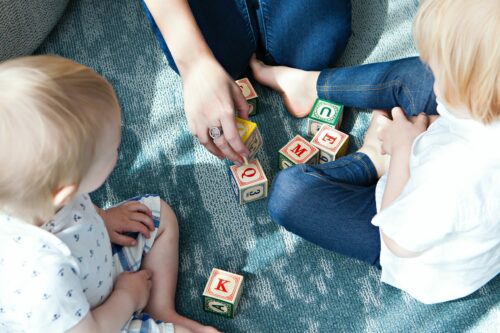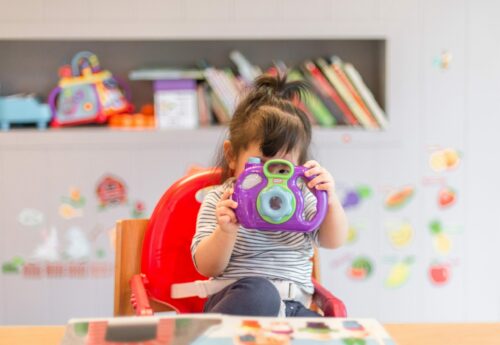For years, I stood on stages and gave parents advice on how to talk to their kids about sex and pornography.
“It’s not a one-time conversation.”
“You have to talk to them once you give them access to the internet because pornography is a predator.”
“Use anatomically correct words.”
“Don’t be embarrassed.”
It’s really easy to say it when you’re the “expert” teaching parents. But I blushed the first time I had to use anatomically correct words to answer my daughter’s questions about her body.
I hid the book Good Pictures Bad Pictures Jr on our office bookshelf. The day my girls discovered it, I literally sat on it until they forgot they had asked me to read it.
While I was pregnant, my daughter asked me how baby brother got in my belly, and my mind flew into a panic. Then she asked how he was going to get out and my brain just hit the “delete” button.
I had to ask myself, “Why am I so embarrassed to talk about this?
All those years I had told parents how to do this, but as a parent, it just feels so difficult! Why?
Stealing Innocence
For parents, especially those who grew up in purity culture, there’s a lot of talk about “stealing innocence.” We don’t want to “awaken love before its time” (which is not what that verse means) by talking to our kids about sex too young. We think there is wisdom in waiting, in hiding, in veiling.
But, I said this in my book, sometimes what we perceive to be wisdom is actually shame.
When we don’t talk about sex in the name of “protecting innocence” what are we saying about sex? That knowing about it is a bad thing. That those who know about it are “guilty” or “impure.” That it is wrong, dirty, even dangerous.
This line of thinking is what will cause parents to shatter when their children find pornography. “What happened to my sweet, innocent, little girl?”
This line of thinking is what causes parents to wait until bridal showers to talk to their daughters about sex.
While the sexual desires of young men are acknowledged and discussed, sexual desire among women (especially Christian women) tends to be demonized. Only worldly, carnal, harlots think about sex, not good Christian girls.
This line of thinking heaps shame on women who struggle with issues like pornography, because “innocent” and “pure” women don’t even know about sex much less seek it out or fantasize about it. It’s the Proverbs 5 vs Proverbs 31 dichotomy that I see so often in Christian circles. You are either the good Christian girl (read: wife) who doesn’t think about sex, washes dishes, cares for the needy, etc, etc or you are the Proverbs 5 harlot who knows too much and will cause the downfall of many a great and stalwart Christian man. It’s an us verses them. The “innocent” versus the “corrupt.” We have ourselves absolutely convinced that talking to our children about sex corrupts them.
We should never equate lack of sexual knowledge with “innocence.”
When we preach that sexual ignorance is optimal and innocent, we preach that sexual knowledge in and of itself is shameful. We shroud sex, not in mystery and glory and beauty, but in shame.
I struggled so much to talk with my girls about sex and pornography partly because I was ashamed of it. I was embarrassed by what I knew. It’s the same sentiment an old college roommate shared with me years ago. “You know the most embarrassing thing about getting pregnant?” she said, “it’s that now everyone knows you have had sex.”
For generations, there has been so much shame and embarrassment around healthy sex and intimacy. While it might be in the name of “protecting God’s plan for sex,” it has actually damaged it.
As I worked through all of my own hesitation, I realized that having healthy conversations with my girls was a way to break this generational cycle of sexual shame.
Talking to our kids about sex doesn’t rob their innocence, it protects them. It honors how God designed them. It honors God’s design for sex.
I knew I had to set aside my own discomfort and start talking to my girls about these things. Because I can’t claim something is beautiful and amazing and at the same time be ashamed of it.
That doesn’t mean I am sitting down and explaining the birds and the bees. That’s not where they are right now (ages 2.5 and 4). Instead, I’m looking at this whole thing like a puzzle. It is put together piece-by-piece, a little at a time. Knowing correct words for body parts is a piece. Understanding reproduction is a piece. Recognizing the value of human life is a piece. Knowing how to express emotions in a healthy way is a piece! Knowing how to have healthy and safe relationships is a piece. Modeling healthy and safe relationships is a piece.
As a mom, I have the whole picture. I have the box lid. I understand a lot about sex, about reproduction, about sexual maturity, about intimacy, even sexual coercion, trauma, and abuse. I worked in a crisis pregnancy center, had my own years-long addiction to pornography, and have taken college level anatomy courses. There’s a lot I know that my kids don’t need to know yet, but that doesn’t mean they don’t need to know anything. I’ve seen what damage that can do firsthand sitting across from 14 year old girls who have no understanding of how their bodies work or how they even got pregnant.
Historically, parents have just kind of thrown the entire puzzle, box and all, at their teenage (or even adult) children and said, “Good luck!”
But what if we saw these conversations as opportunities to build a healthy foundation and view of sex, sexuality, and intimacy?
Over the past few months, we’ve had some practice and here’s what I have found:
Sex is about more than sex.
I alluded to this earlier but we really have to step away from the formulaic “tab A into slot B” mechanical approach we have to discussing sex. Sex is not about sex. Therefore, a healthy and solid foundation for conversations about sex isn’t made up of only conversations about sex.
Healthy sexuality involves so much more than what we do with our reproductive systems. It involves desire, intimacy, relationships, self control, emotional safety, and so much more. These are character traits and concepts I can teach my children long before I connect them to the sexual experience.
How I talk to my daughters about their bodies will influence their understanding of sex. How I talk to my daughters about men will influence their understanding of sex. I can teach them how to have safe boundaries and how to recognize unsafe behavior. I can teach them how to cope with big emotions so they aren’t tempted to run to unhealthy coping mechanisms. They can learn about the importance of friendships and community so they are less likely to be preyed upon. They can learn about forgiveness and grace, so they are less likely to fall victim to crushing shame.
All of those things, though not specifically about the mechanics of sex, have a profound impact on how they will grow to understand sex. The same is true about conversations about pornography. Pornography is the biggest proponent of “sex is just about sex.” Pornography introduces violence and pushing of boundaries. It robs sex of intimacy, emotion, and personhood.
If I want my daughters to be resilient and resistant to the messages of pornography, I can’t be silent. I need to be speaking a better narrative. It is not enough to say, “that’s bad, stay away from it.”
What about it is bad? What about it is unhealthy? And years from now when we have those conversations, I want to be able to build off of conversations we have now.
The more you have these conversations, the less scary and awkward they feel.
When my oldest saw me changing baby brother’s diaper one day and asked what was “wrong” with him, I explained that this was the way God made him, using anatomically correct words. When she later asked my husband if he also had one of those, my husband shot me a look and then answered yes.
Yes, it may feel awkward the first time you use the correct word for anatomy instead of swatting hands and calling things “yucky.” It might feel like you have a mouth full of peanut butter as you try to spit out the words, and then, if you have toddlers, repeat them several times. Yes, it might be super embarassing when you drop your daughter off at children’s church and she announces that her baby brother has a penis. (I’m picturing that scene from the 1990 comedy, Kindergarten Cop). But normalizing this vocabulary has actually been proven to be helpful in protecting children from sexual abuse.
When my daughters first brought me Good Pictures, Bad Pictures Jr, I sat on it because I was so uncomfortable reading it to them. I felt like having Guided Access on the iPad was enough. We now read Good Pictures, Bad Pictures Jr on the regular and even make a game out of finding the hidden cameras.
The more you have these conversations, the more insight you gain into your children.
Let me tell you, my four year old is absolutely amazing. She is so much fun to have conversations with and there are times she absolutely blows me away. Recently, she has been in this pattern of encouraging. Whenever I am feeling stressed out and overwhelmed, she’ll say, “It’s ok, mommy. You need to take the bad thoughts out and give those to Jesus so He can put the good thoughts in!”
That’s what we get to do as parents. We get to lay this framework for life, relationships, and faith. It’s not something fearful. Goodness, it’s a privilege.
Sex is part of that overall conversation. It’s part of life and it is a good and beautiful part of life. That’s what I want them to believe, and if that’s what I want them to believe, that’s the narrative I have to have from day 1.






